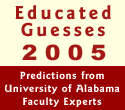 Every year brings the possibility of the next flu epidemic, or even pandemic, regardless of whether or not a flu vaccine is available, according to a University of Alabama epidemiologist.
Every year brings the possibility of the next flu epidemic, or even pandemic, regardless of whether or not a flu vaccine is available, according to a University of Alabama epidemiologist.
“Given the global connectivity that exists because of world travel and a high population density, the potential is always there for a flu pandemic and, sometimes, I feel we may be due for one,” says Dr. John C. Higginbotham, associate dean for research and health policy in UA’s College of Community Health Sciences. “But we cannot say whether that will happen this year or in 10 years.”
A pandemic is an increase in disease over a large geographic area above what would normally be expected, which can result in very serious — or not so serious — consequences, Higginbotham says. The Plague was a pandemic. But so, too, would be a significant increase in the number of people suffering from the common cold, he says.
“We learned a lot with the SARS outbreak and how fast that disease spread,” Higginbotham says. “Although we are certainly better than we were five years ago at handling and dealing with outbreaks once they occur, the potential is there for a pandemic.”
Higginbotham says the good news is that people can take simple and easy steps to protect themselves against the flu: Cover your mouth when you cough; wash your hands often; and stay at home when you are sick. Immunization is also good, particularly for those in high risk groups, such as the elderly, those with chronic health problems and women who will be pregnant this flu season.
“It is important to make more people aware that they can do these simple things to reduce their risk of contracting the flu,” Higginbotham says.
He notes that flu outbreaks vary from year to year. Last year, flu outbreaks started early. While the Centers for Disease Control and Prevention reports that for the 2004-2005 flu season outbreaks have been low so far, these early reports are not necessarily an indication of the severity of an epidemic that might occur in early 2005, Higginbotham says.
In addition to serving as associate dean, Higginbotham is director of the UA Institute for Rural Health Research and interim chair of the department of community and rural Medicine in the College of Community Health Sciences.
Contact
Dr. John Higginbotham, 205/348-7259, jhiggin@cchs.ua.edu